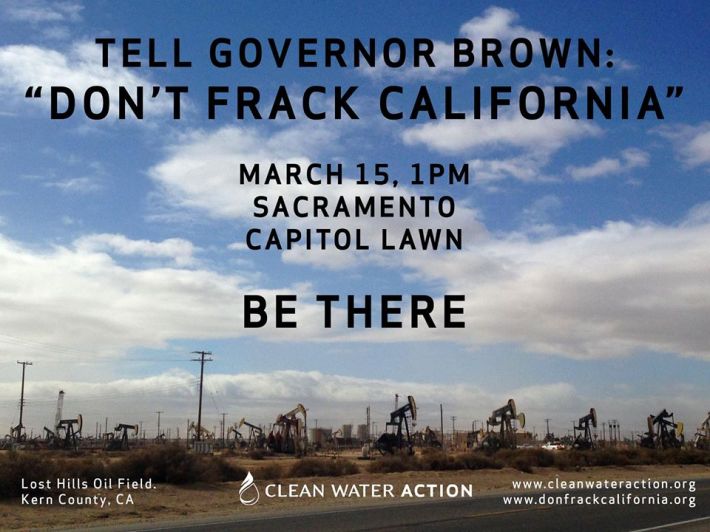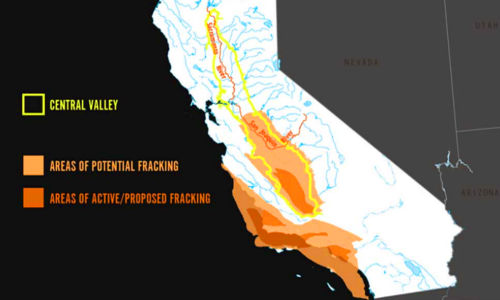
Farmers from all over California, including the Central Valley and coastal areas, showed up at Governor Jerry Brown's office Wednesday with a petition calling for a moratorium on fracking. The same day a similar petition with the signatures of chefs, restaurant owners, winemakers, and brewers from throughout California was also delivered to the governor.
Anti-fracking momentum continues to grow. Earlier today, the L.A. City Council passed a motion that will use zoning codes to effectively ban fracking after the city writes a legal ordinance.
Fracking, or hydraulic fracturing, is a technique to extract oil from otherwise inaccessible deposits by forcing water, mixed with other chemicals and acids, into the ground to break up, or fracture, rocks holding the oil and allow it to flow more freely. There have been charges that the extraction method causes earthquakes, poisons groundwater, and wastes water, yet the practice continues.
California has long been an oil-producing state, and oil wells are so ubiquitous in certain regions that we no longer notice them. Countless small oil wells, many in active production, are interspersed in all kinds of surprising places within L.A. The Central Valley also is a major oil producing region, and the Monterey Shale, an underground deposit in the Central Valley, has been gaining attention because it is a huge potential source of oil, made more accessible due to the invention of fracking. But it sits under long-established communities and farms that grow food crops for the entire country, and concerns that fracking endangers that supply are growing.
Current law requires the California Division of Oil, Gas, and Geothermal Resources (DOGGR) to approve and supervise any oil drilling operations in the state. Last year the legislature passed S.B. 4, which created the state's first regulations on fracking. It requires DOGGR to conduct a study on the hazards and risks from the fracking process.
The law was initially supported by some environmental groups. The assembly's legislative analysis points out that S.B. 4 includes all the key elements recommended by a National Resources Defense Council paper on regulations on fracking, and then some. These elements include prior notification of fracking activities to local residents, disclosure of the amount of water used, what chemicals are used, a description of a well's geologic context, and a waste storage and disposal plan.
We did support S.B.4 last session and and I still think that bill did some good things,” said a senior attorney with the NRDC, Damon Nagami. “But we never thought that S.B. 4 alone was adequate to protect the environment. It was a good start, and Senator Pavely's efforts were needed. But at the very end there were some changes made to the bill that were problematic and we had to withdraw our support.”
Last-minute amendments weakened the bill in two key ways: by allowing DOGGR to waive requirements for EIR analysis if they are below a certain unnamed threshold, and by allowing fracking to continue while agencies draft regulations and study potential environmental impacts.
Last year seven bills related to fracking, including two that would have imposed a moratorium, died in session. This year Holly Mitchell (D-Los Angeles) and Mark Leno (D-San Francisco) introduced S.B. 1132, extending the parameters of the study required under S.B. 4 and imposing a moratorium on fracking until the study is reviewed and the Governor finds that well stimulation treatments do not pose a risk to the public health and welfare or to environmental or economic sustainability.
The NRDC, Californians Against Fracking, the Sierra Club, 350.org, and other organizations and communities support a moratorium on fracking until the state can finish its analysis on the hazards and risks involved in the practice. “We've written letters to the governor,” said Nagami, “because we believe he has the duty and the ability to impose a moratorium if the legislature can't.”
One good thing coming out of S.B. 4 already is data. Said Nagami, “The industry's main talking points have been that fracking has been happening for years already in California and there have been no reported problems....There may have been problems but we didn't know them because there wasn't any data or oversight. We don't even know where they're fracking.”
We're starting to. There's not a whole lot of data yet, and what is available is self-reported, but you can start to map wells that use hydraulic fracking techniques on DOGGR's website here.
The farmers' and chefs' petitions were organized in conjunction with Food & Water Watch, the Center for Biological Diversity, and other groups that are part of the statewide coalition Californians Against Fracking. The petitions focus on fracking's effects on the state's water supply.
Farmers and others object to the fracking industry's wasteful use of water, especially in a drought year. Also, once water is used for fracking a well, it is no longer available for other uses because of the toxic chemicals used in the extraction process, thus further reducing California's limited water supply. In the process, toxic waste that must be disposed of or contained is created, and toxic chemicals can be introduced into groundwater.
Environmental and other groups, communities including Los Angeles, and now farmers and chefs are calling on Governor Brown and state lawmakers to impose a moratorium on fracking until the state can finish its analysis of the hazards and risks associated with the process.
Californians Against Fracking plan to hold a rally in Sacramento on March 15 to press for a halt to fracking in California.






